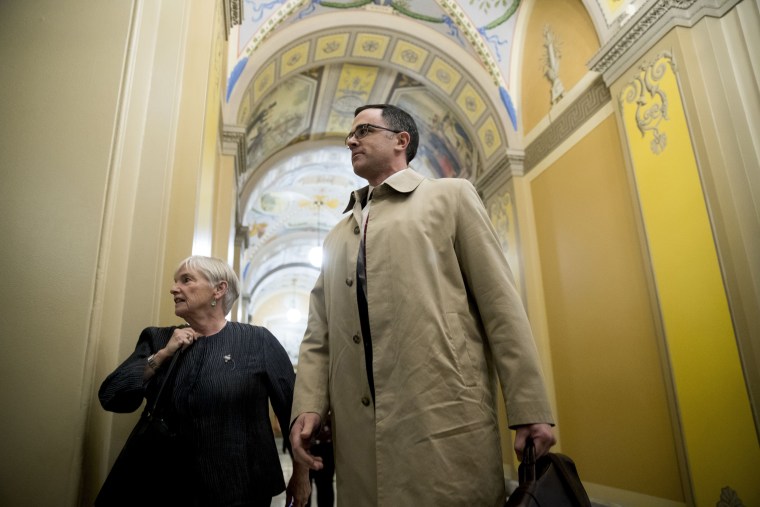WASHINGTON — A day after he resigned from the National Security Council, Tim Morrison told congressional investigators Thursday that he was concerned that the July 25 phone call between Presidents Donald Trump and Volodymyr Zelenskiy of Ukraine would have a negative impact on both politics and policy if it were to become public, according to two sources familiar with his testimony.
Morrison, who was a top adviser on Russia and Europe, was on the call and told investigators that while he thought there was “nothing illegal” about it, including Trump's request that Ukraine open an investigation into former Vice President Joe Biden, he was aware that if the conversation became widely known, it could cause alarm in Washington and have an adverse effect on U.S.-Ukrainian relations, according to a review of his opening statement.
He also told investigators that a conversation he had several weeks later with Gordon Sondland, the U.S. ambassador to the E.U. and a Trump backer, gave him reason to believe that the release of aid to Ukraine might be conditioned on a public statement that it was reopening an investigation into the energy company Burisma. Biden's son Hunter was on the company's board.
And he confirmed "the substance" of U.S. ambassador to Ukraine Bill Taylor's testimony as "accurate," according to two people familiar with his testimony. Taylor testified behind closed doors that Morrison had alerted him to an effort by the president to withhold security aid for Ukraine in exchange for those investigations.
Morrison, who resigned Wednesday just before his testimony, said that his predecessor, Fiona Hill, had warned him about parallel diplomatic efforts to Ukraine: both the regular interagency process and one run by the president’s lawyer Rudy Giuliani and Sondland.
Morrison's name appeared more than a dozen times in testimony by Taylor, who said that Morrison told him he had a "sinking feeling" after learning about a September conversation Sondland had with Trump.
Taylor also said that he himself had been "alarmed" by what Morrison told him about a conversation Sondland had with a top aide to Ukraine's president in which it appeared that "the security assistance — not just the White House meeting — was conditioned on the investigations."
Morrison, while confirming the substance of Taylor's testimony, had a “slightly different recollection” in one respect: Sondland, he said, had told the aide to Zelenskiy that it “could be sufficient” if the new Ukrainian prosecutor general — not Zelenskiy — committed to pursuing the Burisma investigation.
Morrison, an aide to former national security adviser John Bolton, said Thursday he never briefed Trump or Vice President Mike Pence on Ukraine, and was cautious in his statements to investigators, according to a source familiar with his testimony.
“I will give you the most complete information I can, consistent with my obligations to the president and the protection of classified information,” he said, according to a review of his opening statement.
Morrison's testimony under subpoena came as the House on Thursday formally approved a set of rules governing the impeachment inquiry, which has centered on Trump’s conversation with Zelinskiy and related conduct on Ukraine policy.

